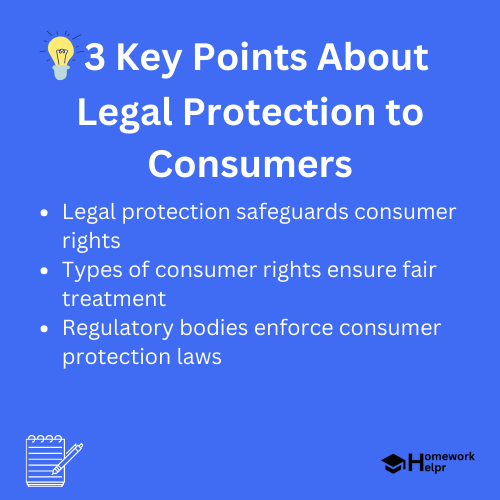📝 Summary
In today’s marketplace, legal protection for consumers is crucial to safeguarding their rights against unfair practices. Consumer protection encompasses laws that ensure product safety, accurate information, and a fair choice of goods and services. Various consumer rights exist, including the right to safety, information, choice, and to be heard. Moreover, global regulations like the Consumer Protection Act (U.S.A) and the Consumer Rights Act (UK) promote ethical business conduct. Consumers need to stay vigilant by researching products, knowing their rights, and reporting unethical practices to contribute to a fair market.
Legal Protection to Consumers
In today’s world, the importance of legal protection for consumers cannot be overstated. Every day, we make decisions about what to buy, where to shop, and which services to use. However, with the increasing complexity of markets and the proliferation of goods and services, consumers are often vulnerable to unfair practices. Legal protection is designed to safeguard consumers‚Äô rights and ensure fair treatment. In this article, we will delve into various aspects of consumer protection laws, their significance, and how they operate within the legal framework.
What is Consumer Protection?
Consumer protection refers to the laws and measures designed to ensure the rights of consumers are upheld. It encompasses a wide range of areas, including product safety, false advertising, and unfair business practices. The primary goal is to shield consumers from unscrupulous practices and ensure they can make informed choices.
Definition
Consumer Protection: It is the practice of safeguarding buyers of goods and services, and the public against unfair business practices.
Types of Consumer Rights
In most countries, consumers are granted specific rights to ensure fair treatment and protection. These rights typically include:
- The Right to Safety: Consumers have the right to be protected from products that are hazardous to their health.
- The Right to Information: Consumers should have access to accurate information regarding the products and services they consider purchasing.
- The Right to Choose: Consumers should be offered a variety of products to choose from, ensuring competition and fairness in the market.
- The Right to be Heard: Consumers have the right to have their complaints and feedback taken into consideration.
Examples
For instance, if you buy a toy that has sharp edges and poses a danger to children, you have the right to demand a refund or a replacement because it violates your right to safety.
Examples
Similarly, if a company advertises a mobile phone with specific features that it fails to deliver, consumers can claim a breach of their right to information.
Consumer Protection Laws Around the World
Various countries have enacted consumer protection laws to defend their citizens against unethical business practices. Some of the notable laws include:
- Consumer Protection Act (U.S.A.): This act aims to protect consumers from misleading and fraudulent business practices through federal regulations.
- Consumer Rights Act (UK): It consolidates several previous laws to ensure that consumers are treated fairly, including protection on goods and services.
- The Competition and Consumer Act (Australia): This law prohibits misleading and deceptive conduct in trade or commerce and continues to enhance consumer rights.
These laws not only protect consumers but also promote fair trading practices among businesses. By adhering to these laws, businesses can build trust and ensure long-term success.
The Role of Regulatory Bodies
Government and independent regulatory bodies are vital in enforcing consumer protection laws. Organizations like the Federal Trade Commission (FTC) in the United States or the Consumer Goods Safety Commission (CPSC) work tirelessly to monitor business practices and investigate fraudulent or harmful activities. These regulatory bodies have the authority to:
- Investigate business practices and take legal action when necessary.
- Enforce regulations to protect consumers, including the recall of dangerous products.
- Provide resources and guidance to consumers regarding their rights.
❓Did You Know?
Did you know that the first consumer protection law was introduced in the U.S. in 1914? It was called the Federal Trade Commission Act, aimed at preventing unfair competition.
How to Protect Yourself as a Consumer
While legal protections are in place, it is still essential for consumers to be vigilant. Here are some ways you can protect yourself:
- Research Products: Before making a purchase, always gather information about the product or service. Look for reviews and check its safety ratings.
- Know Your Rights: Familiarize yourself with the consumer protection laws in your country to understand what you are entitled to.
- Save Receipts: Keep all purchase receipts as they can be critical when claiming a refund or replacement.
- Report Unethical Practices: If you encounter fraudulent business practices, report them to the relevant authorities to help protect other consumers.
Examples
For instance, knowing your right to a refund within a specific period can empower you to return a faulty product without unnecessary hassle.
Conclusion
Legal protection for consumers is an essential aspect of a fair marketplace. It ensures that consumers are treated fairly, have access to safe products, and can make informed decisions. Awareness of consumer rights and the roles of regulatory bodies can protect individuals from unfair practices. As responsible consumers, we must remain informed, cautious, and proactive in understanding our rights. By doing so, not only do we safeguard ourselves, but we also contribute to a healthier and more equitable marketplace for all.

Related Questions on Legal Protection to Consumers
What is consumer protection?
Answer: It is safeguarding consumers against unfair practices.
Why is legal protection for consumers important?
Answer: It ensures fair treatment and safety of consumers.
Name one consumer protection law in the USA.?
Answer: The Consumer Protection Act aims to prevent fraud.
How can consumers protect themselves?
Answer: By researching products and knowing their rights.
